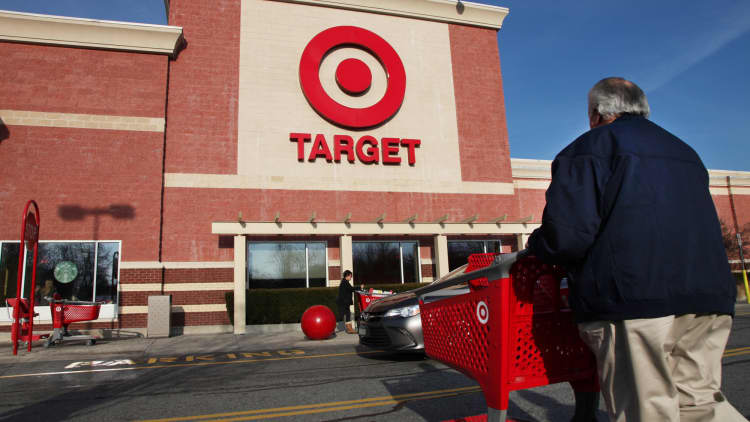
Target's earnings topped Wall Street's estimates, as its sales got a lift from a strong holiday season and store traffic picked up in January.
Shares closed down 6.77% to $173.49 on Tuesday. As of Tuesday's close, the company's shares are up nearly 60%, bringing its market value to $86.88 billion.
The big-box retailer has benefited during the pandemic as shoppers look for easy and safe ways to buy groceries and other items. Its 2020 sales grew by more than $15 billion — greater than its total sales growth over the prior 11 years.
Target already reported holiday sales, but its online sales gained momentum as Americans received $600 stimulus checks. The extra dollars in people's pockets boosted sales across the retail industry, with sales jumping 5.3% in January, according to a government report.
In an interview with CNBC's "Squawk Box," CEO Brian Cornell said the company saw "a surge in traffic in our stores" in January and growth across all merchandise categories, from electronics to beauty. He said customers redeemed gift cards and sought new items to freshen up their homes or wardrobes.
Shoppers are still cautious about the coronavirus, but he said Target is also "seeing a very hopeful consumer who is looking forward to life post-pandemic." He said it expects to see shoppers browsing aisles again and buying items they have recently skipped over, such as impulse items, apparel for work or going out and new luggage as they book a trip to reunite with family or friends.
Still, Target declined to provide a forecast for the year ahead, saying the pandemic has created too much uncertainty.
Here's what the company reported for the fiscal fourth quarter ended Jan. 30 compared with what Wall Street was expecting, based on a survey of analysts by Refinitiv:
- Earnings per share: $2.67 adjusted vs. $2.54 expected
- Revenue: $28.34 billion vs. $27.48 billion expected
In the latest period, net income rose 66% to $1.38 billion, or $2.73 per share, from $834 million, or $1.63 per share a year earlier. Excluding items, Target earned $2.67 per share, more than the $2.54 per share expected by analysts surveyed by Refinitiv.
Revenue rose 21% to $28.34 billion from $23.4 billion last year, higher than analysts' expectations of $27.48 billion.
Comparable sales, a key metric that tracks sales at stores open at least 13 months and online, rose 20.5% compared with a year earlier, as digital comparable sales rose by 118% year over year. That surpassed the 16.8% comparable sales growth that analysts expected, according to StreetAccount.
Target has attracted new customers and inspired more purchases with its e-commerce offerings and wide range of merchandise, from cereal to workout pants, as competitors like Macy's and Kohl's temporarily closed stores and saw sales decline during the pandemic. The big-box retailer said it gained about $9 billion in market share in the fiscal year, citing internal and third-party research.
Customers shopped more frequently with Target and bought more when they did during the holiday quarter. Combined traffic online and in stores grew 6.5% and the average ticket increased by 13.1% compared with a year earlier, the company said.
Target's same-day services like curbside pickup and home delivery service Shipt have been especially popular. Sales through same-day services grew by 212% in the quarter. Sales through its curbside pickup service, Drive Up, grew by more than 500%.
By offering different shopping approaches, Target said it is strengthening customer loyalty. It said customers who shop in multiple channels — such as visiting stores and getting home deliveries by Shipt -- spend nearly four times more on average than a customer who shops only in stores and nearly 10 times more than a customer who only shops online.
In the months ahead, Target will face challenging comparisons because of its heightened sales levels during the global health crisis. It will have to hold on to customers and their wallets as Covid-19 cases decline, more Americans get vaccinated and people can potentially return to old habits. Instead of consolidating trips at a Target store or on its website, shoppers may spend weekends at the mall again or put more of their money toward going to the movies or traveling.
Target said it will invest about $4 billion annually over the next several years to open new stores, remodel others and expand its ability to quickly fulfill online orders.
As of Monday's close, Target shares have risen nearly 81% over the past year and brought the company's market value to $93.19 billion.
Read Target's press release here.



